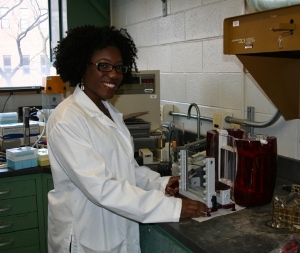Jan 31 2014
A Rutgers–Camden scholar is performing research as part of a collaborative effort with Arizona State University to make significant advancements in nanotechnology.
 Ariel Lane, a graduate student at Rutgers-Camden, works in Dr. Jinglin Fu's lab on a Multidisciplinary University Research Initiative project.
Ariel Lane, a graduate student at Rutgers-Camden, works in Dr. Jinglin Fu's lab on a Multidisciplinary University Research Initiative project.
Jinglin Fu, an assistant professor of chemistry in Rutgers–Camden's Center for Computational and Integrative Biology, has received a $50,000 sub-award to contribute to a Multidisciplinary University Research Initiative (MURI) funded by the U.S. Department of Defense through the Army Research Office.
Fu's task is to use natural DNA molecules to build DNA nanoarchitectures and use them as a template to aid in the study and improvement of disease diagnostics, as well as various biological functions, such as energy conversion.
"There are many enzymes in cells," Fu explains. "We want to know how they communicate or collaborate with each other, so we're creating an artificial system that mimics natural functions in order to make new advancements."
He continues, "One of our goals is to translate cellular biochemistry pathways to non-cellular applications and engineer biomimetic systems that efficiently convert biological sources to energy, like cellulose or sugar."
The MURI research project, titled "Translating Biochemical Pathways to Non-Cellular Environments," encourages a collaborative, interdisciplinary approach to research among teams of investigators whose expertise range from biology to engineering.
At Rutgers–Camden, the project also presents a chance for students to gain hands-on research experience in a lab setting. Ariel Lane, a graduate student pursuing her master's degree in chemistry at Rutgers–Camden, is assisting Fu with the study.
"I'm excited to have an opportunity to be a part of a significant research project like this one," says Lane, a Somerset resident who received her bachelor's degree in forensic science from Long Island University. "Having real research experience in the lab at the master's level is invaluable as I work toward my career goals."
Rutgers–Camden's Center of Computational and Integrative Biology combines the expertise of scholars from traditional biomedical disciplines with the analytic methods employed by mathematicians and computer scientists to understand how individual biological systems work.
Fu, a Collingswood resident, received his bachelor's and master's degree from Zhejiang University in China and his doctoral degree from Arizona State University. He joined Rutgers–Camden in September 2013. Fu's research focus is on bionanotechnology, biocatalysis, and spatially interactive biomolecular networks.